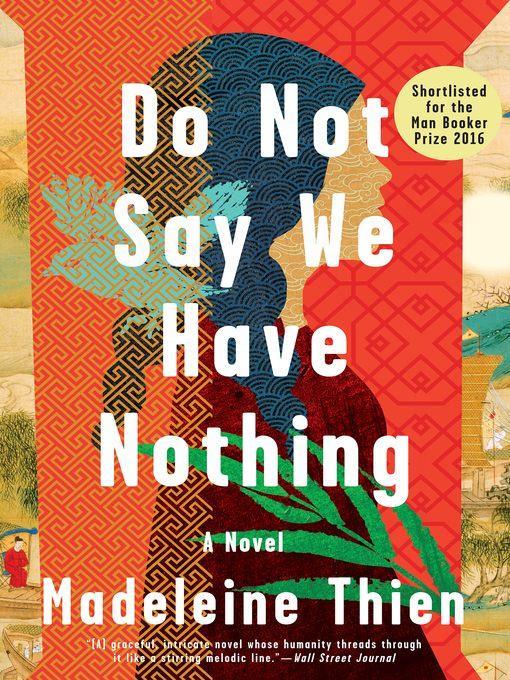
Do Not Say We Have Nothing
A Novel
کتاب های مرتبط
- اطلاعات
- نقد و بررسی
- دیدگاه کاربران
نقد و بررسی

Starred review from July 11, 2016
In Thien's luminescent third novel (following Dogs at the Perimeter, which won the Frankfurt Book Fair's 2015 LiBeraturpreis), stories, music, and mathematics weave together to tell one family's tale within the unfolding of recent Chinese history. Beginning in 1989 in Hong Kong and Vancouver, this narrative snakes both forward and backward, describing how a pair of sisters survived land reform, re-education at the hands of the Communists, the coming of the Red Guard, the Cultural Revolution, and the protests at Tiananmen square. The story is partially told by the central character, mathematics professor Marie Jiang (Jiang Li-ling), as she discovers her late father's past as a pianist, which was left behind and concealed when he left China for Canada. Thien takes readers into the Shanghai Conservatory of Music, where Marie's father studied with composer Sparrow and violinist Zhuli in the midst of the cultural upheaval in the 1960s. Filled with intrigue, shifting loyalties, broken families, and unbroken resistance, this novel is beautifully poetic and as carefully constructed as the Bach sonatas that make frequent appearance in the text. Thien's reachâthough epic âdoes not extend beyond her capacity, resulting in a lovely fugue of a book that meditates on fascism, resistance, and personhood. Agent: Sarah Chalfant, Wylie Agency.

Starred review from October 15, 2016
Shortlisted for this year's Man Booker Prize, Thien's ambitious saga explores the upheavals in Chinese politics from 1949 to the present through several generations of friends, family, and lovers whose intersecting destinies are upturned by the sweep of events.In 1989, at the time of the Tiananmen Square uprising, Jiang Kai, a renowned concert pianist in China before he defected in the '70s, abandons his wife and 10-year-old daughter, Marie, in Vancouver to fly to Hong Kong, where he commits suicide. Soon afterward, Ai-ming, the 19-year-old daughter of Kai's former teacher at the Shanghai Conservatory of Music, who was killed by authorities during the uprising, flees China and arrives in Vancouver. The girls soon bond reading the Book of Records, a never-seeming-to-end series of notebooks left among Kai's possessions and written in the handwriting of Ai-ming's father, Sparrow. The novel follows Marie as she unravels the mystery of her father's death, his life as a musician in China, and his relationship with Sparrow. She is guided by the notebooks, which narrate a parallel, fairy-tale version of events. But the heart of the story lies with Kai and Sparrow and their attempts to define themselves inside the rapidly shifting political climate that turns against artists and intellectuals during the Cultural Revolution of the 1960s. Fear and pragmatism drive ambitious 17-year-old pianist Kai, who watched his family starve to death as a child in the 1959 famine; joining the Red Guard allows him to pursue his music within limits. Kai's teacher/friend/lover Sparrow, a composer of genius whose family is torn apart by party loyalties, wills himself into creative invisibility, choosing survival over art. Sparrow's cousin, the violinist Zhuli, whom both men love, refuses to join or hide, and her idealism destroys her. Through these and a host of other sharply rendered characters, Thien (Certainty, 2007) dissects China's social and political history while raising universal questions about creativity, loyalty, and identity. Mythic yet realistic, panoramic yet intimate, intellectual yet romantic--Thien has written a concerto dauntingly complex and deeply haunting.
COPYRIGHT(2016) Kirkus Reviews, ALL RIGHTS RESERVED.

























دیدگاه کاربران